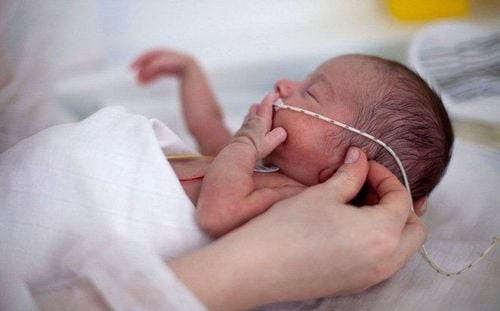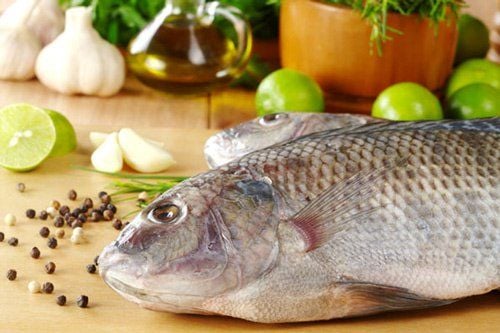This is an automatically translated article.
New research shows that eating fish during pregnancy can help avoid giving birth too early. A combination of studies has shown that increasing consumption of fish fatty acids (long-chain omega-3 fatty acids) reduces the risk of preterm birth.
1. Research on fish consumption during pregnancy and the risk of preterm birth
Statistics show that around 15 million babies worldwide are born prematurely every year. In the United States, one in 10 babies is born prematurely, leading to an increased risk of serious health problems. In Vietnam, the number of premature babies born prematurely in recent years has shown signs of increasing, reaching 7% - corresponding to more than 100,000 babies born prematurely every year in the country due to many reasons.
Although the exact cause of preterm birth is unknown. But it is necessary that in some areas of high fish consumption, the gestation period seems to last longer. This has prompted researchers to find out whether pregnant women should eat fish to reduce premature birth.
Specifically, a study that followed more than 100,000 pregnancies, classified women with a single pregnancy for the first time, excluding those with poor health conditions or a previous pregnancy that may increase the risk of preterm birth. . All had blood samples taken to measure long-chain fatty acids (EPA and DHA) during the first and third trimesters of pregnancy.
EPA and DHA are mainly found in fish and other seafood, especially cold sea fish - like salmon, mackerel, tuna, herring and sardines. These fatty acids are also found in nuts, vegetable oils and supplements, such as orange juice and some fortified dairy products.
Based on this fatty acid intake, pregnant women were classified into 5 groups, from lowest to highest intake. At the end of the study, there were 376 women who gave birth before 34 weeks of gestation and 348 women who did not give birth early. The group with the lowest consumption had a 10-fold increased risk of premature delivery compared with women with the higher consumption of omega-3 fatty acids. The results also showed that women in the second lowest consumption group were 2.7 times more likely to give birth prematurely than those in the upper group.

Số liệu thống kê cho thấy có khoảng 15 triệu trẻ sơ sinh trên toàn thế giới bị sinh non mỗi năm
But because the researchers only measured fatty acid levels in the blood, it's not clear how much fish or fish oil these pregnant women consumed. The reason these fatty acids can prevent preterm birth is unknown. The study was only designed to find an association, not cause and effect. But one theory is that these fatty acids may reduce inflammation, which in turn reduces the risk of preterm birth.
2. Is it safe to eat fish during pregnancy?
In general, long-chain omega-3 fatty acids are actually important building blocks for certain cells:
A lack of these fatty acids can cause cellular stress on the placenta or on the mother DHA has the effect of promoting brain development, enhancing memory for children, especially in the last 3 months of pregnancy. Moreover, fish is also rich in protein - an essential nutrient to support the development of the baby, helping create hair, bones, skin and muscle cells of the fetus Eating fish during pregnancy also works to prevent the risk of depression during and after birth, lower blood pressure, reduce blood fat and good for the heart system. maternal pulse. It is recommended that women consume long-chain omega-3 fatty acids during early pregnancy, as well as throughout pregnancy. Ideally, women can start eating more fish or taking fish oil supplements before becoming pregnant.
Concern around whether pregnant women should eat fish comes from information that some fish contain high levels of mercury. The good news is that most fish high in omega-3 fatty acids are the best choice for pregnant women. The FDA recommends that pregnant women eat 2 to 3 servings of fatty acid-rich fish. To protect health, you should choose fish rich in DHA, protein, minerals and low in mercury such as:
Salmon: Rich in vitamins B12, B6, vitamin D, niacin, selenium, iodine, phosphorus, iron and DHA , good for health. It is recommended to eat about 360g of salmon per week. Snakehead fish / fish: In snakehead fish meat, there are protid, lipid, calcium, phosphorus, iron and some other nutrients that are good for pregnant women and mothers after giving birth. Carp: Is one of the best fish for pregnant women, especially those with a passive pregnancy. Carp meat contains many nutrients such as omega-3, folic acid, calcium, glutamic acid, glycine and arginine... Red snapper: A delicious fish, suitable for use in everyday dishes and beneficial to the fetus. extra. Red snapper meat is rich in protein, vitamins A, B, D and minerals (phosphorus and iodine), and low in fat, so it is easy to digest. In addition, proper fish processing also minimizes the risk of mercury poisoning. Here are a few tips for choosing and preparing fish for pregnant women:
In general all seafood should be thoroughly cooked to remove toxins Shellfish (clams, oysters and mussels) should be cooked until the shell opens. If the shell does not open, do not eat. Choose fresh food. Clean and then store in the refrigerator/freezer if not eaten immediately. Avoid eating raw fish because there is a high risk of infection. Eat fish during pregnancy in the recommended amount (226 - 340g/week), avoid overeating and Consult a doctor in case of unusual symptoms.

Cá diêu hồng là loài cá thơm ngon, thích hợp dùng trong các món ăn hàng ngày và có lợi cho thai phụ
In summary, the researchers found that women with the lowest intake of fatty acids from fish during the first 6 months of pregnancy were 10 times more likely to have a preterm birth than women who consumed the most fatty acids from fish. best. While it's unclear how safe it is to eat fish during pregnancy, research has shown a strong correlation between a low fatty acid intake and a high rate of preterm birth. The first 3 months are the most sensitive time during pregnancy. In order for mother and baby to be healthy, parents need to pay attention to:
Understand early signs of pregnancy, pregnancy poisoning, bleeding during pregnancy. Timely, correct and sufficient first prenatal check-up, avoiding too early/too late. Fetal malformation screening at 12 weeks detects dangerous fetal malformations that can be intervened early. Distinguish between normal vaginal bleeding and pathological vaginal bleeding for timely intervention to maintain pregnancy. Screening for thyroid disease in the first 3 months of pregnancy avoids dangerous risks before and during delivery. Vinmec currently has many maternity packages (12-27-36 weeks), in which the 12-week maternity package helps monitor the health of mother and baby right from the beginning of pregnancy, early detection and timely intervention of health issues. In addition to the usual services, the maternity monitoring program from 12 weeks has special services that other maternity packages do not have such as: Double Test or Triple Test to screen for fetal malformations; Quantitative angiogenesis factor test to diagnose preeclampsia; thyroid screening test; Rubella test; Testing for parasites transmitted from mother to child seriously affects the baby's brain and physical development after birth.
For more information about the 12-week maternity package and registration, you can contact the clinics and hospitals of Vinmec health system nationwide.
Please dial HOTLINE for more information or register for an appointment HERE. Download MyVinmec app to make appointments faster and to manage your bookings easily.
Reference source: webmd.com












